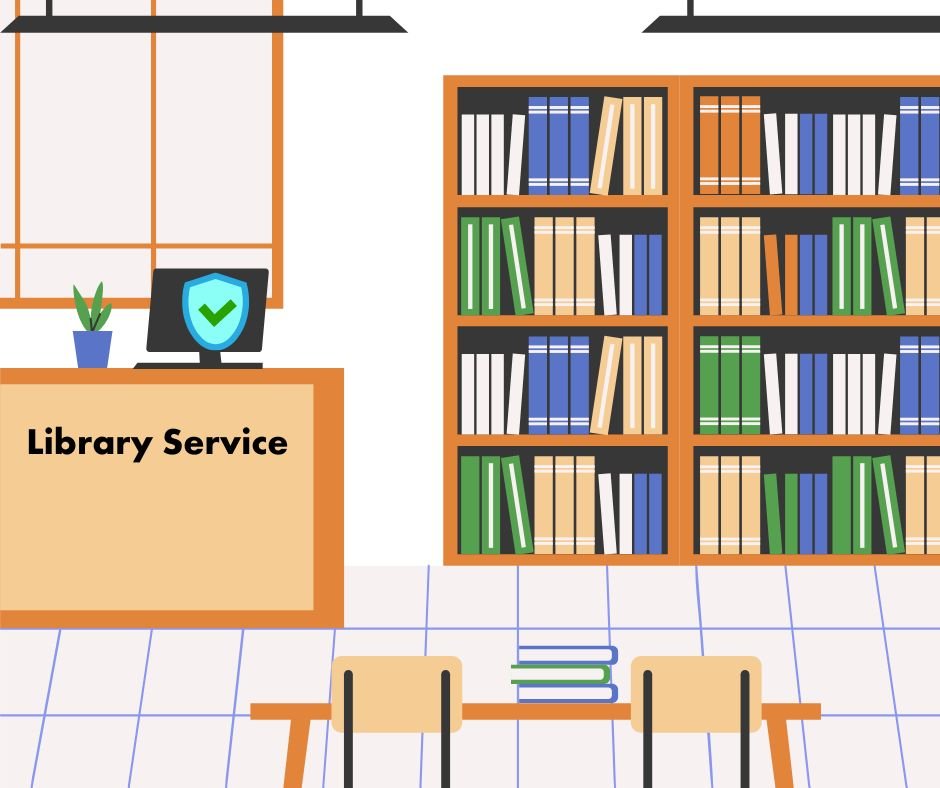Until the middle of the eighteenth century, libraries were mainly limited to a handful of people. It would be more accurate to say that libraries were for a few. At that time, the doors of libraries were open only to scholars, university students, and the wealthy. The efforts of librarians ended this inferiority complex. They transformed libraries into public welfare institutions. Due to the efforts of librarians, today the ‘library’ all over the world is the joy of the human mind, a strong slogan of education, a modern educational research laboratory. Without a library, education ,, incomplete. Only the library plays a supportive role in creating a healthy environment for education.
Based on this theory, an education system without a library cannot fulfill humanity, especially in terms of acquiring knowledge and research. In many countries, library materials are now within the reach of any student (through inter-library cooperation). If necessary, materials are available at any time, just by sending a request. Modern librarians always try to keep readers aware. They encourage readers to read books through various exhibitions, brochures, book festivals, fairs, discussion programs, summaries, etc. In this way, it can be seen that they make themselves social workers by getting the opportunity to form a reading society. They are truly the backbone of the nation.

Challenges and Problems of Library Service:
In today’s complex world, institutional libraries are faced with many obstacles, problems and challenges. These are information explosion, economy, security, photocopying and censorship, etc., taking the right steps or getting involved in danger due to carelessness or ignorance. Overall, the problems are discussed keeping all types of libraries in front of them.
1. Information explosion:
Every year, endless information is created on every subject, new information is created and old mysteries are revealed, which researchers are very interested and anxious to know. The amount of information and materials published on any general subject almost doubles or triples every 10 to 15 years. This information explosion is a big problem for libraries and information centers. In this case, they cannot fall behind, information researchers also have to control this wave of information explosion. At the same time, a vigilant eye has to be kept on it so that the general reader can be informed about new information. Therefore, librarians and information scientists must be very careful in their selection of materials in order to make the most effective contribution to limited resources and materials. As the purchasing power of the library increases, the librarian’s responsibilities increase – because he then has to arrange and select more books. This information explosion also makes it difficult for information seekers to select content and decide which information is essential to read. Like the population explosion, the abundance of information is a problem for both libraries and users.
- Retrieval tools: Fortunately, the quality of information retrieval tools is improving in recent times. This trend is very helpful in eliminating the immediate complications of library services and will continue to play a helpful role in the future. A large number of high-quality information books such as directories, guides, catalogs, bibliographies, abstracts, etc. are published to guide the information system. With the launch of the documentation service, there is no shortage of information books and information guides. With the help of these, librarians, information scientists, researchers and readers all benefit simultaneously. If the librarians are willing, it is possible to provide services according to the mood of the reader with the help of these.
- Micro-reproductions: This era of technological advancement is helping librarians a lot with the problem of information explosion. Micro-reproductions are widely used these days. Among them, microfilm and microfiche are one of the library support tools. With the help of these, modern libraries are doing the impossible. It has become possible in this era of micro-reproduction to store a lot of information much smaller than the average size and in a nominal space. Nowadays, it is possible to store an entire large book on a card measuring just two to three and a half inches by three and a half inches. If such a good arrangement is made, the benefits of the library will reach every member of society at all levels. The production cost of the Western-style cards, however, is only a few cents.
- Computer Service: Another helpful tool to solve the problem of information explosion is computer service. In developed countries, today, books, papers, and other information are being transacted through computers. With the blessings of science, information storage and distribution have become possible with the help of computer systems. Even a few years ago, satellites and television in the middle of the earth helped American readers and researchers by sending book texts and images from one location to another. Today, readers worldwide can access the most recent information through the Internet.
2. Allocation:
Like schools, hospitals,, and other institutions, libraries are almost always in financial distress. Public libraries are dependent on wages. Private or municipal libraries are run based on membership dues, local welfare institutions and donations from the public. In addition, each type of library contributes its share to the limited budget of the institution concerned. That is, the budget is limited in every case. Historically, it is seen that every year the allocation is slightly changed and some more money is added to the old budget of the New Year and such cheap slogans as “budget increase” are arranged. In reality, it is observed that the increase in the cost of salaries, allowances, tuition and other ancillary expenses does not actually lead to any improvement. Rather, it creates pressure on the limited budget. Therefore, for good reason, the librarian has to face increasing problems for selection and evaluation-based work. On the other hand, the controlling officer of the government public library is a single officer. For all these reasons, the small public libraries with government funds have to be always vigilant to achieve the satisfaction of the higher controlling officer. Sometimes they have to face obstacles. In this case, since the trend of development is gradually moving backward, it is rather natural
3. Security:
Every year, the library loses many valuable books, magazines and reading materials through theft and other means. The librarian always thinks that if his readers are honest, regular, aware, and responsible and follow the library rules and regulations, then the national treasure books cannot be lost. Since readers can enter the library without hindrance and use everything they like. So there is no need to steal. However, he also thinks that entering the library without hindrance and using reading materials as they like encourages some of the users to steal. In this regard, the library often faces problems and various problems arise in making decisions. They often suffer from hesitation in making decisions because they should let the readers go very easily to prevent the said theft or try to make them go through the check-and-check grid. Some libraries take a lot of security measures to prevent theft. In this system, a door guard sits and watches those who enter or leave through the door. This makes it possible to create a barrier to unauthorized entry or exit. In addition, magnetic devices are used on the doors to prevent unauthorized entry or exit of anything into the library .Library members can enter using a specially prepared membership card at the entrance, but if you want to enter the library of someone who is not a member, you just fill out a form and make a day card, and then get an entrance ticket. Only academicians or librarians do not need to pay for a day card. Others have to pay a fixed fee
4. Photocopying:
Photocopying is a very familiar word in modern libraries. To save the time of the reader/user, almost all libraries today have a system to photocopy a few necessary pages of a book or periodical at a nominal cost. There is no hesitation in saying that it is a pity that there is no photocopier in the library these days. Because in this era of technology, photocopying has become an unspoken part of the library.
Firstly, the library reference collection cannot be taken out. Despite the interest of the reader in reading, the reader may be deprived of reading the book.
Secondly, since the reference collection in every library is small in number, the pressure of reading is stale.
Thirdly, the price of reference books is naturally high, so they are purchased in limited numbers. In addition, the publication of standard reference texts is also limited and not easily available.
Therefore, considering these problems, library photocopying is absolutely necessary. Where the Internet is now in the hands of people all over the world, it is unimaginable that there will not be a photocopy in the library. And the role of photocopying in the speed of service delivery is immense. Many people in libraries think that photocopying is a copyright violation, but in reality it is not. Because photocopying can be done in a limited scope for the purpose of providing more services with limited resources or to meet someone’s immediate reading needs, but photocopying for commercial purposes is completely illegal and a violation of international copyright law.
One of the most sensitive issues for librarians is the issue of censorship.
1. Many people believe that there are some materials that should not have been published in any way. Even if they are published to satisfy someone’s personal vile interests, they should not be accessible in libraries.
2. Most of these are publications about sex. Then there are some that promote political petty interests and incite a section of the public against the government.
3. There are some publications that are completely against the character of a person deprived of freedom. These books are written by people who cannot be read by themselves and are not suitable for others to give them.
Modern librarians are controlling these with his knowledge.



